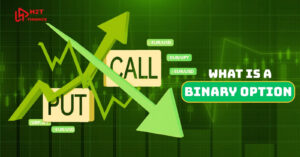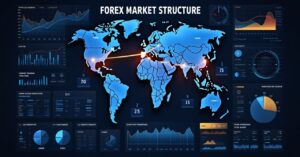“What is a forex business?" is often understood in various ways, sometimes causing confusion for newcomers. Wondering if it could be a potential career path or investment opportunity? This article will clarify this definition, helping you distinguish between treating individual forex trading as a genuine business endeavor and understanding the diverse types of businesses operating within the vast forex industry. Let's delve into the details with H2T Finance to gain a comprehensive and accurate overview!
1. Understanding what is a forex business: More than just clicks
Essentially, the term "forex business" can refer to two main concepts:
- The act of individuals trading foreign currencies with a professional, systematic approach, much like running their own enterprise. This involves strategic planning, capital management, risk control, and aiming for consistent profitability.
- The various commercial enterprises and organizations that operate within or support the broader foreign exchange industry. These include entities like forex brokers, technology providers, and educational companies.
So, when asking what is a forex business, the answer depends on whether you're looking at it from the perspective of an individual trader striving for financial success or the larger ecosystem of companies facilitating global currency exchange. It’s an arena that involves far more than just the mechanical act of buying and selling currencies.
To elaborate, the foreign exchange (forex or fx) market itself is a decentralized global marketplace where national currencies are traded. A "business" in any context generally implies an organized activity with clear objectives, often profit-driven, requiring planning, resource management, and risk assessment.
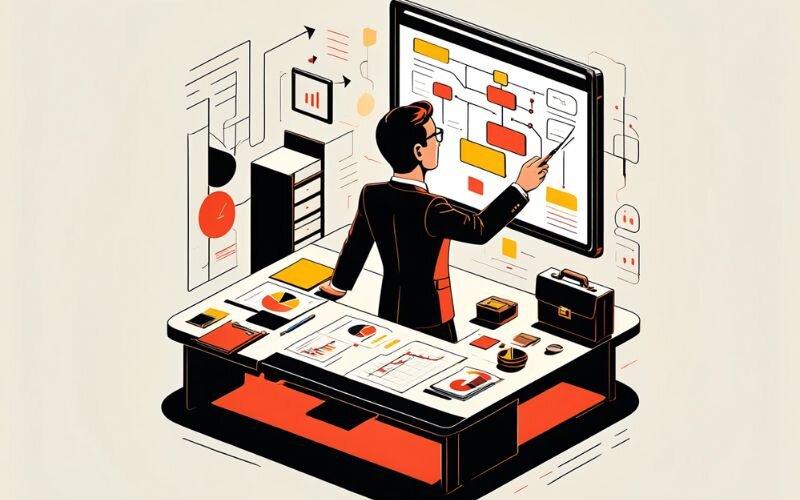
Therefore, understanding the forex business means recognizing these two facets:
- Forex trading as a personal business venture: This is about an individual trader adopting a business-like mindset.
- Formal business entities within the forex industry: These are the "industry players" that make the market function.
A crucial distinction to make early on is between treating forex trading as a casual hobby and approaching it as a serious business. Hobby trading often lacks structure and consistent risk management. In contrast, a business approach to forex trading necessitates a professional mindset, a well-defined trading plan, disciplined execution, and continuous performance analysis, much like any other entrepreneurial pursuit.
2. Forex trading as a personal business venture
When exploring what is a forex business, one of the most common interpretations, especially for individuals, is the endeavor of treating personal currency trading as a dedicated business operation. This means transforming what might start as a casual interest into a structured, professional pursuit aimed at generating profit. If you decide to run your forex trading like a business, you are, in effect, establishing your own small enterprise within the financial markets.
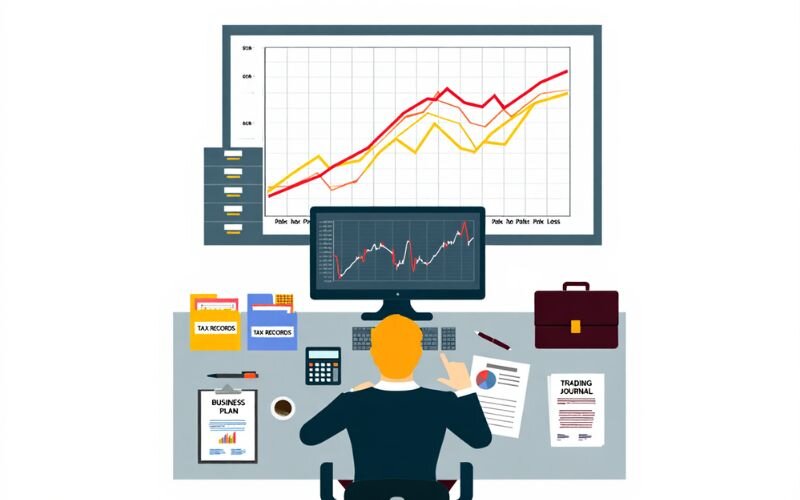
2.1. Key elements of treating your forex trading like a business
For an individual's forex trading activities to qualify as a legitimate business, rather than just a hobby, several fundamental elements must be present. These are the cornerstones that can contribute to what makes a successful forex trader who operates with a business mindset.
-
Trading plan: This is the foundational document for your personal forex business.
-
Why it's essential: A trading plan establishes clear objectives, defines specific strategies for entering and exiting trades, and sets out precise rules for trade management. It serves to minimize impulsive decisions and emotional trading.
-
Basic components: An effective plan should detail the currency pairs you intend to trade, your chosen analytical methods (e.g., technical analysis, fundamental analysis, or a combination), comprehensive risk management protocols, realistic profit targets, and a schedule for reviewing and refining the plan.
-
-
Capital management: This is the financial stewardship of your trading business.
-
Determine appropriate investment capital: The capital for your trading business should be funds you are genuinely prepared to lose, distinct from money needed for daily living expenses or other essential financial commitments.
-
Manage risk per trade: A widely accepted principle in capital management is to risk only a small, predefined percentage (often 1-2%) of your total trading capital on any individual trade. This prudent approach helps to ensure that a series of unsuccessful trades does not catastrophically deplete your business's capital.
-
-
Discipline and psychology: This addresses the critical mental aspects of running a trading business.
-
Adhere to your plan and control emotions: Operating a successful trading business requires unwavering discipline in following your trading plan, particularly when confronted with common trading emotions like greed, fear, or overconfidence.
-
Importance of a trading journal: Consistently documenting all trades – including the rationale for entry and exit, the market conditions, and your emotional state during the trade – is invaluable. A trading journal helps to identify behavioral patterns, learn from both successes and mistakes, and reinforce disciplined trading habits.
-
-
Continuous learning and adaptation: The forex market is a constantly evolving environment.
-
Stay updated: A commitment to ongoing education and skill development is crucial for any forex business. Market dynamics, economic factors, and trading technologies change, requiring traders to adapt.
-
Analyze trades for improvement: Regularly reviewing past trades – both winners and losers – provides critical insights for refining strategies and improving decision-making processes over time.
-
-
Record keeping and performance analysis: Essential for tracking the health and progress of your trading business.
-
Track key metrics: Maintain meticulous records of all trading activity, including profits, losses, win/loss ratios, average risk/reward ratios, and other relevant performance indicators.
-
Periodic strategy review: Use this data to objectively evaluate the ongoing effectiveness of your trading strategies and make data-driven adjustments as needed.
-
2.2. Pros and cons of running forex trading as your business
Considering forex trading as a business involves weighing its potential upsides against its significant downsides.
-
Advantages:
-
Flexibility: One of the attractive aspects is the flexibility it offers in terms of working hours and location, as trading can often be conducted from anywhere with a reliable internet connection.
-
Potential for high returns: The forex market presents the possibility of substantial financial returns, particularly when leverage is utilized (though it's critical to remember that leverage also magnifies potential losses). This relates to the idea of "making money in the forex market," but should always be balanced with risk awareness.
-
Relatively low barrier to entry (capital-wise): Compared to the startup costs of many traditional businesses, the initial capital needed to begin trading forex can be comparatively lower. However, this should not be mistaken for ease of success, and being undercapitalized remains a significant risk.
-
Accessibility: The global forex market operates 24 hours a day, five days a week, offering numerous trading opportunities across various international sessions.
-
-
Disadvantages and risks: Understanding these is vital when assessing the viability of a forex trading business and the inherent risks in the forex business.
-
High risk of loss: This is the most critical risk. Traders can lose their entire invested capital, and in some situations (depending on the broker and account type), losses can even exceed the initial deposit if negative balance protection is not in place.
-
Emotional stress and pressure: The inherent uncertainty, the speed of market movements, and the direct financial consequences of trading decisions can lead to considerable emotional stress and psychological pressure.
-
Requires significant time and effort: Achieving proficiency and consistency in forex trading demands a substantial commitment of time and effort dedicated to learning, practicing, market analysis, and ongoing strategy development.
-
No guaranteed income: Unlike traditional employment, a forex trading business offers no guarantee of regular or predictable income, especially during the initial learning curve and development phase. Profitability can be erratic.
-
2.3. Is forex trading a legitimate business for individuals?
The question of whether individual forex trading constitutes a legitimate business is a valid concern.
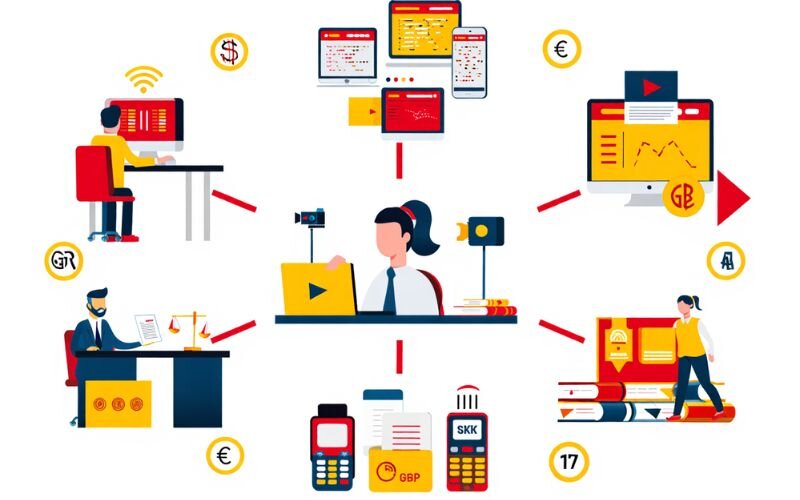
- Legality: In most countries, it is generally legal for individuals to participate in forex trading. Nevertheless, financial regulations can differ widely between jurisdictions. Aspiring traders need to research and understand the specific legal and tax implications within their country of residence, especially concerning the brokers they choose.
- Legitimacy as a "business": Beyond the legal aspect, the "legitimacy" of forex trading as a personal business is largely determined by the professionalism, diligence, and ethical conduct of the individual trader. When approached with serious intent, comprehensive preparation, sound risk management principles, and a commitment to continuous improvement, it can indeed be considered a legitimate business endeavor.
- Distinguish from scams: It is crucial to differentiate genuine forex trading from fraudulent schemes and scams that often exploit the allure of quick profits in the forex market to deceive unsuspecting individuals. These scams frequently promise unrealistic returns with little to no risk, which is a clear warning sign. A legitimate approach to a forex business acknowledges, understands, and actively manages risk.
See more related articles:
- How to find a broker for forex? A step-by-step guide
- How to get money from forex? A 7-step guide you need in 2025
- Does Blusky allow scalping? Explore the trading methods available at Blusky for investors
3. The wider forex business landscape: Answering 'what is a forex business' from an industry perspective
Beyond individual trading ventures, the answer to "what is a forex business? "extends to a diverse ecosystem of commercial entities. These organizations form the backbone of the global foreign exchange market, providing the infrastructure, technology, liquidity, and services that enable currency trading on a massive scale. Understanding these types of forex businesses is crucial for a comprehensive view of the industry. The forex business model of each varies significantly.
3.1. Forex brokers: Your gateway to the market
Perhaps the most commonly encountered type of a forex business for an individual trader is a forex broker. Brokers act as intermediaries, providing traders with access to trading platforms, facilitating the execution of buy and sell orders, and often offering leverage (the ability to control a larger position with a smaller amount of capital).
Broker's business model: Forex brokers typically operate under one of two main models:
- Dealing Desk (Market Maker): These brokers often take the other side of their clients' trades, effectively creating a market for them. They profit from the bid-ask spread and may also profit from client losses. Advantages can include fixed spreads, but potential conflicts of interest are a concern.
- No Dealing Desk (NDD): These brokers pass their clients' orders directly to liquidity providers (interbank market). NDD brokers can be further categorized into Straight Through Processing (STP) or Electronic Communication Network (ECN) models. They primarily earn from small mark-ups on the spread or through commissions. This model generally reduces conflicts of interest.
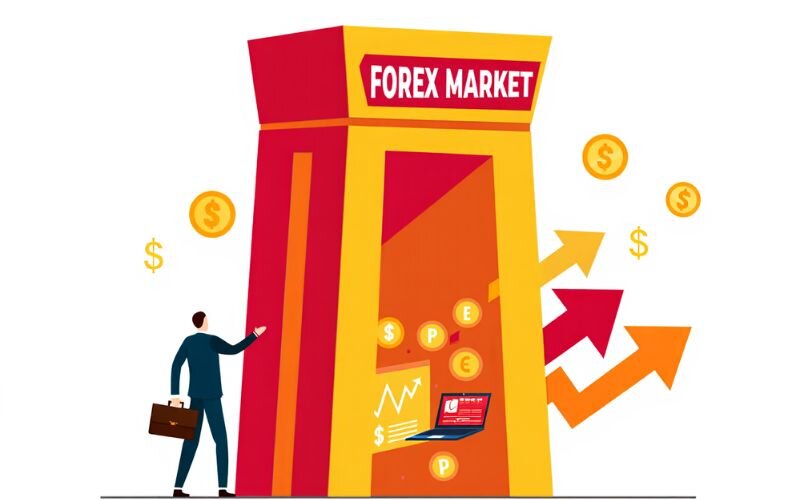
The primary revenue streams for brokers include spreads (the difference between the bid and ask price), commissions per trade, and swap fees (overnight financing charges). Beginners should understand the importance of selecting a well-regulated and reputable broker as a critical first step.
3.2. Liquidity providers (LPs): Ensuring market fluidity
Behind the scenes of many brokerages are liquidity providers. LPs are typically major banks, financial institutions, and large investment firms that provide the bulk of the buy and sell orders in the forex market. They essentially offer a large pool of currencies for trading.
LPs are vital for ensuring market depth and fluidity, which means trades can be executed quickly and at competitive prices with minimal slippage, especially for large orders. Without them, the market would be far less efficient. This is a fundamental part of how a forex business at the institutional level operates.
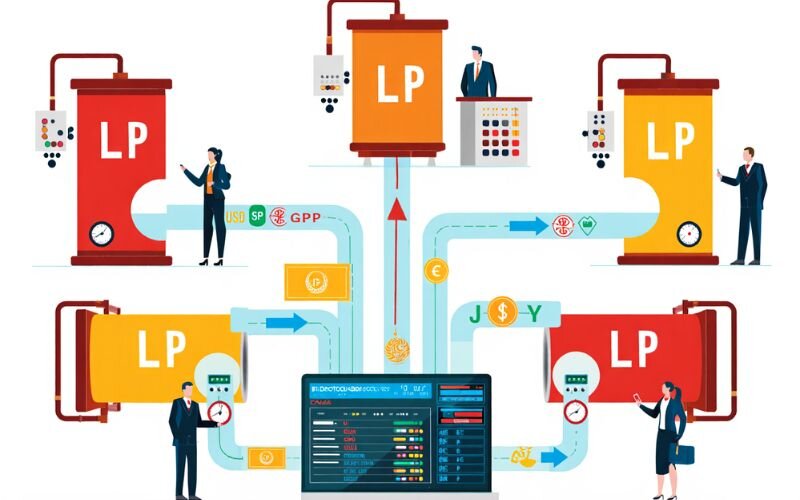
3.3. Financial technology (FinTech) companies: Powering the trades
The forex industry heavily relies on financial technology (FinTech) companies. These businesses are a crucial part of the modern forex ecosystem. Services provided:
- Developing and maintaining trading platforms (e.g., MetaTrader 4/5, cTrader, proprietary platforms).
- Creating analytical tools, technical indicators, and automated trading systems like Expert Advisors (EAs).
- Offering payment processing solutions, data security systems, and connectivity infrastructure for the trading industry.

3.4. Forex education and coaching businesses
Given the complexity of forex trading, a forex education business plays a significant role. These businesses provide a range of learning resources, including online courses, trading manuals, live webinars, seminars, and workshops.
Services: Some also offer one-on-one coaching, mentorship programs, and trading strategy development assistance.
While valuable, it's crucial for learners to diligently vet educational providers for quality, credibility, and transparency, as the quality can vary widely. H2T Finance aims to be a trusted source of foundational forex education.

3.5. Forex signal providers and managed account services
Another segment of the forex business landscape includes forex signal providers and those offering managed account services. These services offer specific trade recommendations (e.g., "buy EUR/USD at X price, stop-loss at Y, take-profit at Z").
Managed accounts (PAMM/MAM): Professional money managers trade on behalf of clients, pooling funds (PAMM - Percent Allocation Management Module) or managing individual sub-accounts (MAM - Multi-Account Manager).
While potentially appealing for those lacking time or expertise, these services carry high risks and require extreme due diligence. Past performance is never a guarantee of future results, and the potential for scams is significant. H2T Finance advises extreme caution and thorough research before engaging with such services.
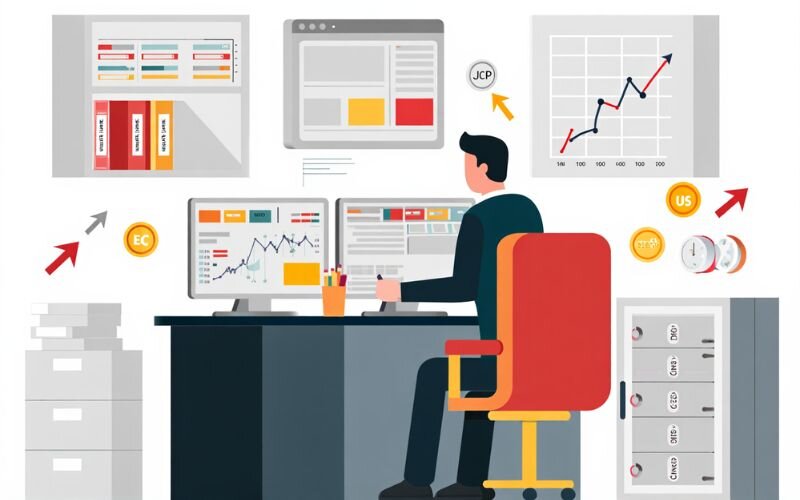
3.6. Other ancillary forex businesses
Beyond the core categories, numerous other types of businesses contribute to the forex industry. These represent further forex business opportunities.
- Introducing Brokers (IBs): Individuals or companies that refer clients to a forex broker in exchange for a commission or a share of the revenue generated from those clients.
- Forex fund management: Firms that manage investment funds specifically focused on trading forex.
- Media, news, and analytics services: Companies providing forex-related news, market analysis, charting tools, and economic data.
- Compliance and regulatory consulting: Firms that help other forex businesses navigate the complex legal and regulatory requirements of the industry.
Understanding these different types of forex businesses provides a clearer picture of the industry's structure and the various players involved in the global currency markets.
4. Key requirements and considerations for any forex business involvement
Whether you're considering treating your personal trading as a forex business or aiming to understand the broader industry, there are fundamental requirements for forex business involvement and crucial factors to consider. This preparation is akin to understanding how to start a forex business in a general sense, by laying the right groundwork.
4.1. Capital: How much do you really need?
Capital is a primary consideration for any business, and a forex-related venture is no different.
- For personal trading: There's no single fixed amount of capital required to start trading forex. The "right" amount depends heavily on your individual financial situation, your trading goals, and your tolerance for risk. A widely shared piece of advice for beginners is to start with capital you can genuinely afford to lose without impacting your essential living expenses. Attempting to trade with insufficient capital can lead to excessive risk-taking and emotional decisions.
- For establishing formal forex businesses: If one were to consider establishing a forex business like a brokerage firm or an investment fund, the capital requirements are substantially larger and far more complex. These ventures involve significant operational costs, regulatory capital, and technological investments. (This article focuses on foundational knowledge, so we won't delve deep here, but it's important for context).
4.2. Knowledge and skills: The foundation of success
Success in any aspect of the forex world, especially when treating it as a business, is built on a solid foundation of knowledge and skills.
- Market understanding: It's vital to develop a good understanding of the forex market, including how it operates, what factors influence currency prices (e.g., economic news, geopolitical events), and the characteristics of different currency pairs.
- Analytical skills: This involves learning about technical analysis (studying price charts and patterns) and/or fundamental analysis (assessing economic indicators and news).
- Risk management skills: Perhaps one of the most critical skills is effective risk management. This includes knowing how to set stop-loss orders, manage position sizing, and protect your trading capital.
- Practical experience: Theoretical knowledge is important, but hands-on practice is essential. Many brokers offer demo accounts, which allow beginners to practice trading with virtual money in a real market environment before risking actual capital.
4.3. Understanding and embracing risk
A clear and realistic understanding of risk is non-negotiable. The risks in the forex business, particularly in trading, are significant.
-
Forex is a high-risk market: The potential for profit in forex trading is often highlighted, but it's equally important to recognize that it is a high-risk activity.
-
Invest only what you can afford to lose: This principle cannot be overstated. You should never invest money that you cannot afford to lose entirely.
-
Key types of risk: Traders and forex businesses face various risks, including:
-
Market risk: The risk of losses due to adverse movements in currency prices.
-
Leverage risk: While leverage can amplify profits, it also magnifies losses.
-
Liquidity risk: The risk of not being able to buy or sell at desired prices due to insufficient market activity.
-
Broker risk: The risk associated with the reliability and financial stability of your chosen broker (for traders).
-
4.4. The regulatory environment: A brief overview
The forex market operates within a global regulatory landscape, which can vary significantly from one country to another.
-
Country-specific regulations: Each nation typically has its own set of rules and regulatory bodies governing forex trading and forex businesses.
-
Importance of regulated brokers (for traders): If you are an individual trader, it is generally advisable to trade with brokers that are regulated by a reputable financial authority in a well-established jurisdiction. Regulation can offer a degree of investor protection, though it doesn't eliminate trading risks.
-
Legal requirements for formal forex businesses: Establishing a formal forex business, such as a brokerage, involves navigating a complex web of legal and regulatory requirements, often necessitating specialized legal counsel.
Considering these key requirements and potential challenges is a vital step before engaging more deeply with any form of forex business.
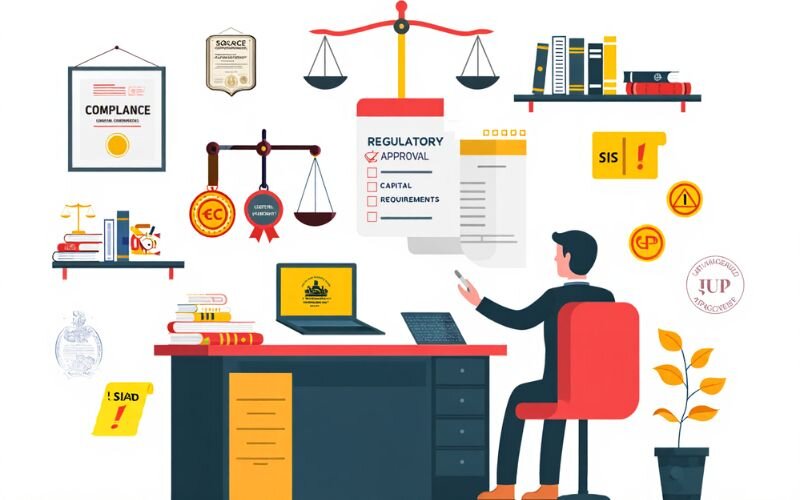
5. FAQ about the forex business
Here are answers to some common questions about what is a forex business:
Q1: Can forex trading truly be a full-time business?
A: Yes, for some individuals, it can become a full-time business. However, this typically requires significant capital, extensive knowledge, strong discipline, a well-developed trading plan, and consistent profitability over time. It involves substantial risk and is not a guaranteed path.
Q2: What is the most common type of forex business people encounter?
A: For most individuals, the most commonly encountered type of a forex business is a forex broker. Brokers provide the necessary trading platforms and access to the currency markets.
Q3: How much capital do I realistically need to start treating forex trading as a serious business?
A: There's no magic number, as it depends on your strategy, risk tolerance, and income goals. While you can start with a few hundred dollars, serious trading often requires more to manage risk effectively. Critically, only use capital you can afford to lose.
Q4: Is it better to trade forex yourself or use a forex-related business service like a signal provider?
A: This depends on your knowledge, available time, and risk appetite. Trading yourself offers full control but demands significant learning. Services like signal providers might save time but introduce their own risks (including reliability and cost), and past performance doesn't guarantee future results. Always conduct thorough research.
Q5: What is the business of forex?
A: The "business of forex" broadly refers to all commercial activities related to the foreign exchange market. This includes individual professional trading, brokerage services, technology provision, liquidity provision, education, and more.
Q6: Is $100 enough to start forex trading as a business?
A: While you can technically start trading with $100 with some brokers, it's very challenging to treat it as a serious business with such a small amount. It severely limits your ability to manage risk effectively and withstand normal market fluctuations.
Q7: Is forex a profitable business?
A: Forex trading can be a profitable business for those who develop the necessary skills, discipline, and risk management strategies. However, it also carries a high risk of loss, and many individuals do not achieve consistent profitability. For established forex industry businesses (like brokers), profitability depends on their business model and operational efficiency.
Q8: How does a forex business (like a broker) make money?
A: Forex brokers primarily make money through spreads (the difference between buy and sell prices), commissions on trades, and swap fees (overnight financing charges).
6. Conclusion: Understanding "What is a Forex Business"
Hopefully, this guide has provided you with a clearer and more comprehensive understanding of what is a forex business. We've explored it from two main angles: the endeavor of an individual treating their trading as a serious business, and the wider industry of companies that facilitate global currency exchange.
Key takeaways to remember:
- "A forex business" can refer to an individual's disciplined approach to trading currencies for profit, or it can describe various enterprises within the forex industry (e.g., brokers, tech providers, educators).
- Treating personal forex trading like a business requires a solid trading plan, robust capital and risk management, discipline, continuous learning, and meticulous record-keeping.
- The broader forex industry encompasses diverse businesses, including brokers, liquidity providers, FinTech companies, educational services, and signal providers, each with its own role and business model.
- All forex business involvement, especially trading, carries significant risk. Thorough preparation, a commitment to education, and a realistic understanding of these risks are essential.
Equipping yourself with solid foundational knowledge is the most crucial first step on any journey into the dynamic world of the forex market. Curious about how the Forex market operates? Ready to learn more with H2T Finance? Explore our Forex Basics section for essential Forex knowledge.
